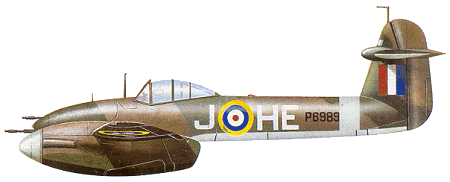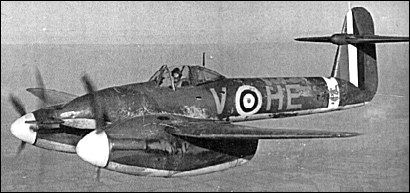|
| The only Westland fighter to achieve operational status with the RAF, the Whirlwind was designed in response to Specification F.37/35 for a "cannon fighter" armed with four 20mm guns. As the P.9, the Westland design emerged as a low-wing monoplane with two Rolls-Royce Peregrine I 12-cylinder liquid-cooled Vee engines, each rated at 885hp at 4575m. The four Hispano Mk I guns were grouped in the nose, the pilot enjoyed a good all-round view from a fully-enclosed cockpit in line with the wing trailing edge, and radiators were buried in the wing leading edges inboard of the nacelles. Construction was of metal throughout, with flush-riveted stressed skins, a novelty being the use of magnesium rather than aluminium sheet to cover the monocoque fuselage aft of the cockpit. Two prototypes were ordered by the Air Ministry in February 1937, and the first of these flew on 11 October
1938. Despite delays in development and production of
the Peregrine engine, two contracts were placed in
1939, each for 200 fighters as Whirlwind Is, and the first
series aircraft flew in June 1940. In the event, produc
tion ended with 114 aircraft built, these serving with
only two RAF squadrons (Nos 263 and 137). Armament
problems and changing operational needs curtailed the
usefulness of the Whirlwind, which was enhanced in
late 1942 by the addition of a pair of wing racks to carry
two 113kg or 227kg bombs. Operational use of the Westland fighter came to an end in November 1943.

| MODEL | Whirlwind |
| WEIGHTS |
| Take-off weight | 5165 kg | 11387 lb |
| Empty weight | 3770 kg | 8311 lb |
| DIMENSIONS |
| Wingspan | 13.72 m | 45 ft 0 in |
| Length | 9.83 m | 32 ft 3 in |
| Height | 3.20 m | 11 ft 6 in |
| Wing area | 23.22 m2 | 249.94 sq ft |
| PERFORMANCE |
| Max. speed | 579 km/h | 360 mph |
| Ceiling | 9150 m | 30000 ft |
| Range | 1287 km | 800 miles |
 | A three-view drawing (650 x 539) |
| Stuart Hawkins, e-mail, 07.04.2012 13:22 Walter, I'm part of the research team for the Whirlwind Fighter Project, who are building a full scale, stactic replica of the Whirlwind.
Would it be okay if we contact your goodself as we're in need of as much information as we can get and finding people who actually worked on the P9 project, is proving difficult to say the least... reply | | Stuart Willard, e-mail, 19.03.2012 12:23 The point about range with Merlins is a well made one it certainly would have made it effectively a cannon armed interceptor in the Spitfire range which is why once cannon armed spits were available though potentially more lethal the WW was no longer a priority. Its role was already considered a long range fighter escort when a role was being sought for it but its range wasnt really up to that job once France fell and daytime bombing declined. I suspect that re engining alone would have been only part of any upgrade, wing an fuselage design would likely have been changed along with it.
It wasnt designed with Merlins in mind (Petter wanted those) is simply because at the time Merlins were an unreliable prototype and the Peregrines were considered a 'reliable' back up engine. Other aircraft were designed to use it but fell by the wayside and yes the Vulture cancelation ( a double Perigrine) was the final straw.
Out of interest luck plays a massive role here. The Spitfire was initially a stopgap solution with only some 300 being ordered till the Typhoon could come into service. The rest is history.
The Mosquito like the Merlin powered WW was purely built as a company backed solution and disinterest from the Air Ministry. Even DeHavilland himself was not committed to its production and only fortunate circumstances gave it a belated go ahead. Same with the Hornet (the WW concept perfected years later) it only got the go ahead because jets were going to be unsuitable in the Pacific theatre but then found itself without a role, but was shown to be extremely effective post war in arial combat simulations against Sea Furies. reply | | Andre Verreault, e-mail, 13.03.2012 01:37 To Walter Mcgowan
If possible would you help me to find photos of the battery installation I am building it at 1 /24 scale
THANK YOU reply | | dekspaik, e-mail, 09.01.2012 07:37 Merely replacing the Peregrines with Merlins - in itself a massively complicated process - would not have produced a dream machine. The limited fuel capacity and hence a short range would heve been exacerbated by the installation of more powerful engines. reply | |
| | Barry Kevin Flewitt, e-mail, 08.01.2012 19:40 Fitted with Merlins I think that this aircraft would have been a real bomber killer.
Working with Spitfires and Hurricanes the quartet of 20mm cannons would have torn the bombers apart. When we are told that the Merlins were needed for other aircraft, we have to ask were they better employed in Fairy Battles and Defiants?
Even today the Whirlwind looks modern for it's time and that near bubble canopy gave the pilot a much better view than most of it's contemporaries.
The high T tail might have given the pilot problems when bailing out though. reply | | andy, e-mail, 07.12.2011 21:23 Hello everyone,
It seems to me that the Whirlwind's potential wasn't totally ignored. If we look at De Havilland's Hornet there are many similarities, it's a pity though that this design came too late to make a difference. reply | | paul scott, e-mail, 01.07.2011 23:11 A fine aircraft, as many of you have said, hampered by the engine problems with the Peregrine and, as has been said, Merlin engines needed to be given priority to other aircraft. What would this have been like with Merlins I wonder??? reply | | telle, e-mail, 26.05.2011 00:50 An outstanding aircraft plagued by underpowered and unreliable engines, This certainly was a missed opportunity by a short sighted Air Ministry. reply | | Oliver Hill, e-mail, 03.03.2011 16:02 Since the Lysander was the only aircraft I was sure of recognising, for christmas 1944,when I was 12,I received "The Book of Westland Aircraft" which has a page of description and photos plus a page with side, front and top drawings of the Whirlwind. I can e-mail photos if anyone wants. reply | | Klaatu83, e-mail, 15.11.2010 04:58 The biggest drawback to the Whirlwind was, without doubt, the decision to design it around the Rolls-Royce Peregrine engine. At that time lot of different types of aircraft used the Rolls-Royce Merlin, but this was the only one designed to use the somewhat smaller Peregrine. With a major war going on and demand for the maximum production of Merlin engines a vital national priority, it was understandable that the powers-that-be at the British Air Ministry should have decided to curtail development and production of a special airplane engine used in only a single type of aircraft. The same thing happened to the Vulture engine used in the ill-starred Avro Manchester, which was subsequently resurrected as the highly-successful Merlin-engined Lancaster. If Westland had been able to re-design the Whirlwind around the Merlin it's fate might have been different. Fortunately, however, the RAF had a much more versatile twin Merlin-engined fighter-bomber to fall back on, the De Havilland Mosquito. reply | | tracey, e-mail, 20.10.2010 16:45 hello to all of you that know Ray Wood (my dad) who died very suddenly on 20th sept. I just wanted to say thank you to those of you that attended the funeral. I have been informed that my dad's "whirly" is now in situ at Norwich aviation museum.. thank you to all involved, he would have been very pleased. I have been asked by a couple of people to carry on my dad's love of aeroplanes and produce a couple of paintings, so they are now in construction, so lets hope i can deliver!! thanks again. Tracey x reply | | G. Thornber, e-mail, 29.09.2010 00:48 the only time I saw one of these was early in the war and it was flying very low over the beach at Blackpool. It was still secret and, as a youngster I was very excited about it. It was only a few seconds before it was gone.
But I can still see it in my minds eye, with its very unusual and impressive shape. reply | | G. Thornber, e-mail, 29.09.2010 00:47 the only time I saw one of these was early in the war and it was flying very low over the beach at Blackpool. It was still secret and, as a youngster I was very excited about it. It was only a few seconds before it was gone.
But I can still see it in my minds eye, with its very unusual and impressive shape. reply | | jerry brewer, e-mail, 26.09.2010 00:39 Hi Walter
were you involved in the undercarriage design for the merlin whirlwind,I am most interested in how it worked out with the merlin arrangement, any information you recall would be most welcome here
jerry reply | |
| | Stuart Willard, e-mail, 23.09.2010 19:28 Just an update and a sad one too in part. I have just heard that Ray wood has suddenly died.
On a better note I am very much in contact with Jim Munro so if you would like to contact me Willie I would be delighted to make sure you can get hold of him.
Equally Walter your information is extremely interesting and Jim who is producing a film on the aircraft would love to hear from you as would I as I am busy visualising a Merlin powered Whirlwind. Any help you could give on this mater and already it seems your information has cleared up an important aspect i would love to hear from you.
This is true of anyone else too who has contributed here and is not in contact with Jim. I would love to talk to you and connect you with Jim.
stuartwillarduk@gmail.com reply | | Doc, e-mail, 22.09.2010 11:08 Is this site still active?
If so, anybody got detail drawings /plans?
For what reason?
We will get to that later. For now I need detail as to structure and build, ok.
Doc reply | | Willie Dickson, e-mail, 09.09.2010 18:16 My great uncle Bertram Dickson carried out the first ever air recce It was done on 21Sept 1910. The event has been featured on the BBC'S fLYING sCOTS ON 9.12.02. A "Jim Munro" was featured and interviewed as a Bertram Dickson biographer. My family is very keen indeed to trace Jim to invite him to the centennial celebrations on 21.9 10. Anyone able to advise me please. reply | | TONY STRAW., e-mail, 07.07.2010 13:28 At last I now have a fully completed "Whirlwind" with cockpit canopy. Next jobs are a "Lysander" and " Wyvern". I need to find larger models as the eyes are not so good these days. I've found a "Wyvern" Kit from a company called Trumpeter which is a larger scale.I have a "Lysander" Kit but that is 1 /72 a bit too fiddly I think. reply | | David Wicks, e-mail, 04.08.2010 19:57 I was interested to read the comments from Anthony Pugh dated 30.11.09. My father in law Bill Ireson was on the dive bombing raid with Anthony's Uncle (Tom Pugh) when he was killed in action on 2nd August 1943. I understand that Tom had just armed his bombs when his aircraft was hit by flack and literally exploded in mid air. Anthony may like to know that Bill (O.C. of A Flight on 182) who survived the war and is still living at 93 had a very high regard for Tom. reply | | Walter McGowan, e-mail, 07.08.2010 05:43 I worked on the P9 the first prototype in the Experiment shop, 1938. I was an apprentice. After a flight I was with the ground crew after a flight. It was a cold wind blowing, "high ups" and the cold ground crew drifted off for shelter.
I was told to stay with the plane.
I was alone and so climbed into the cockpit for warmth.
Picture an 18 year old youth in charge of a secret fighter.
Imagine that today.
Later I was promoted to the design department and worked on the installation of 2 Merlin in the production version.
This was not to order yet, so the funding was Westlands.
At that time the firm was taken over by John Browns the ship building people. They refused to finance the project.
So we stopped the design.
What a mistake. Initially the guns were drum fed, limited the firing time but later had belt feed.
They sure made quick work of trains and enemy road convoys.
I have a model where I can see it each day. reply |
|
Do you have any comments?
|
| 
COMPANY
PROFILE
All the World's Rotorcraft
|








